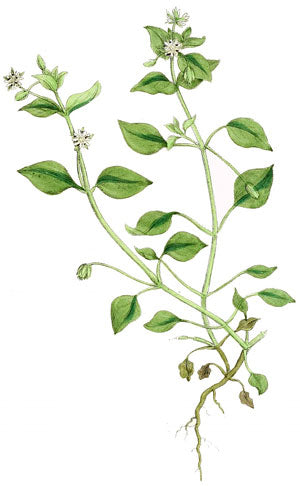Herb Article
Chickweed
By Amber Brisson, Certified clinical herbalist & nutritionist
 Common Name
Common Name
Chickweed
Latin Name
Stellaria media
Parts used
Leaves, fresh or dried
Medicinal Properties
Chickweed is a small annual plant with succulent leaves that grows in temperate zones throughout Europe & North America. It thrives in moist, shady spots in yards and woods, especially around the bottom of trees. The Latin name Stellaria means little star, in reference to the white star shaped flowers. The fine hairs along the leaves differentiate Stellaria media from other plants in the Chickweed family.
Chickweed is one of the first plants to appear after winter and can be used fresh or dried for later use. This nutritional powerhouse is packed with many vitamins & minerals including B6, B12, D, Magnesium, Iron, Calcium, Potassium, Zinc, and more. It has been used to help the body assimilate nutrients more efficiently and the fresh leaves are a delicious and nutritious addition to spring salads. As a spring tonic, Chickweed has traditionally been used to help cleanse the blood and will add strength and vitality to any person after a long winter.
This simple and tiny plant has a wide range of medicinal properties as Jethro Kloss author of Back to Eden explains, "It heals and soothes anything it comes in contact with". Eclectic herbalists from the early 19th century prized this herb & its ability to alleviate and cool inflammation both internally and externally. Used in a bath, or as a poultice, wash, and salve, Chickweed has traditionally been used to calm itchy skin conditions such as rashes and eczema. The external application of this herb has also been used to soothe wounds, arthritis, sore eyes, and hemorrhoids.
Herbalist Rosemary Gladstar elucidates on this virtuous herb, "Chickweed is very powerful. It cures through nourishment, especially helping the kidneys to regulate water." Historically used to drive off excess dampness and fats, Chickweed has been used to support the process of metabolism and balance water levels in the body. A decoction of this plant has been used as a gentle and safe way to relieve constipation. This little plant is a reminder that some of nature's best medicine comes in nearby, discreet and safe forms.
Preparations & Applications
The leaves are prepared fresh or dried as an infusion, decoction, tincture, salve, or poultice. Steep 1 Tbsp per cup water for 30 minutes or bring to boil 1 Tbsp herb per cup water then reduce heat and simmer for 20 minutes.
Spring Cleaning Tea
1 pt Nettle
1 pt Dandelion leaf
1 pt Chickweed
1/2 pt Rosehips
1/2 pt Spearmint
1/2 pt Linden
1 Tbsp tea blend per cup water. Pour hot water over and steep for 15 min -- 8 hours. Longer steep times increase bioavailability of minerals and nutrients. Strain and enjoy!
 Common Name
Common Name Chickweed
Latin Name
Stellaria media
Parts used
Leaves, fresh or dried
Medicinal Properties
Chickweed is a small annual plant with succulent leaves that grows in temperate zones throughout Europe & North America. It thrives in moist, shady spots in yards and woods, especially around the bottom of trees. The Latin name Stellaria means little star, in reference to the white star shaped flowers. The fine hairs along the leaves differentiate Stellaria media from other plants in the Chickweed family.
Chickweed is one of the first plants to appear after winter and can be used fresh or dried for later use. This nutritional powerhouse is packed with many vitamins & minerals including B6, B12, D, Magnesium, Iron, Calcium, Potassium, Zinc, and more. It has been used to help the body assimilate nutrients more efficiently and the fresh leaves are a delicious and nutritious addition to spring salads. As a spring tonic, Chickweed has traditionally been used to help cleanse the blood and will add strength and vitality to any person after a long winter.
This simple and tiny plant has a wide range of medicinal properties as Jethro Kloss author of Back to Eden explains, "It heals and soothes anything it comes in contact with". Eclectic herbalists from the early 19th century prized this herb & its ability to alleviate and cool inflammation both internally and externally. Used in a bath, or as a poultice, wash, and salve, Chickweed has traditionally been used to calm itchy skin conditions such as rashes and eczema. The external application of this herb has also been used to soothe wounds, arthritis, sore eyes, and hemorrhoids.
Herbalist Rosemary Gladstar elucidates on this virtuous herb, "Chickweed is very powerful. It cures through nourishment, especially helping the kidneys to regulate water." Historically used to drive off excess dampness and fats, Chickweed has been used to support the process of metabolism and balance water levels in the body. A decoction of this plant has been used as a gentle and safe way to relieve constipation. This little plant is a reminder that some of nature's best medicine comes in nearby, discreet and safe forms.
Preparations & Applications
The leaves are prepared fresh or dried as an infusion, decoction, tincture, salve, or poultice. Steep 1 Tbsp per cup water for 30 minutes or bring to boil 1 Tbsp herb per cup water then reduce heat and simmer for 20 minutes.
Spring Cleaning Tea
1 pt Nettle
1 pt Dandelion leaf
1 pt Chickweed
1/2 pt Rosehips
1/2 pt Spearmint
1/2 pt Linden
1 Tbsp tea blend per cup water. Pour hot water over and steep for 15 min -- 8 hours. Longer steep times increase bioavailability of minerals and nutrients. Strain and enjoy!




